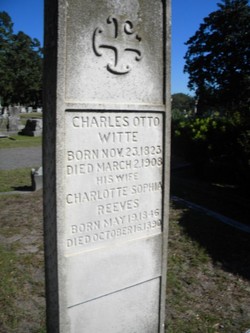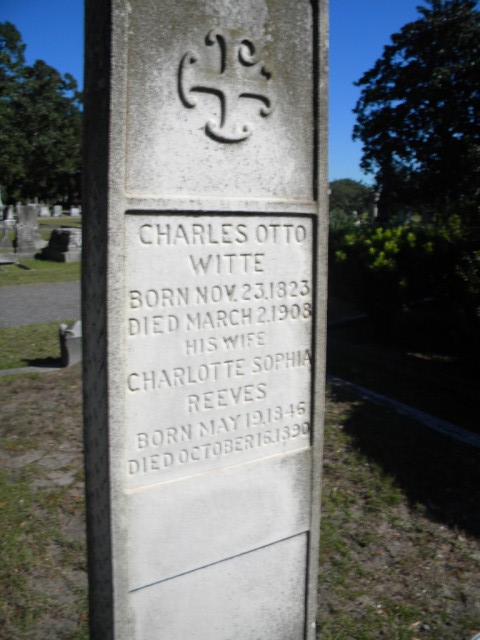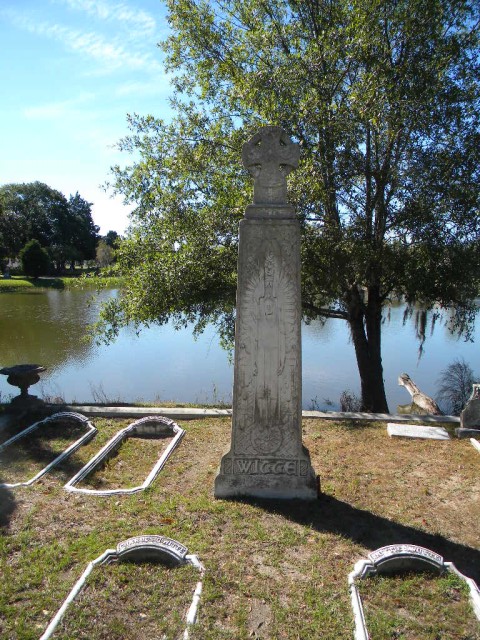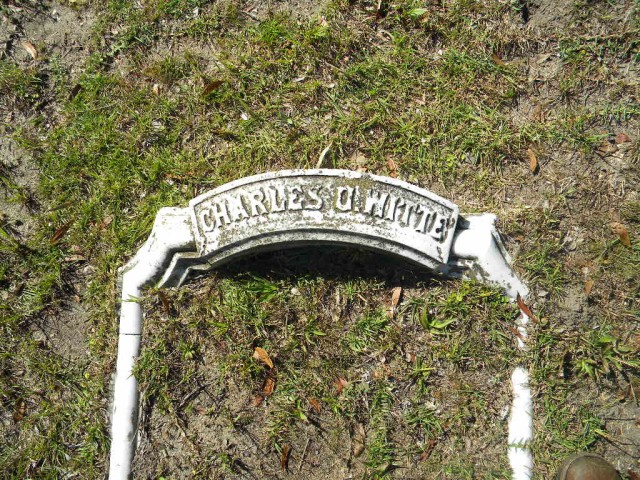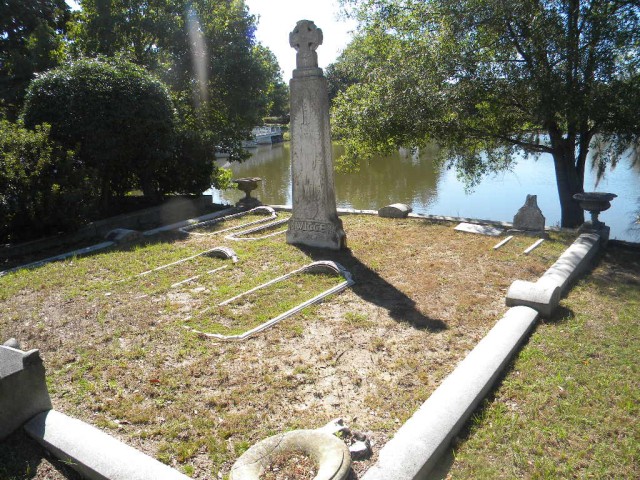Witte, Charles Otto, merchant, banker, and representative of foreign governments, was born in Blomberg, Principality of Lippe-Detmold, November 23, 1823. His father was Ernst Witte, a graduate of the University of Jena with the degree of Doctor of Law, who, in 1848 represented the count of Luneburg in the upper house of the parliament of the kingdom of Hanover, being the only member of that body not a nobleman. His grandfather, also Ernst Witte, was a wealthy merchant of Blomberg and mayor of the city, holding office by life tenure. His mother was Lisette Linnemann of Hovededissen. The first of the name of whom the family have documentary records was Bernhard Witte, who came with Count Simon de Lippe from Saxony-Weimar and settled at Horn in Lippe-Detmold in the sixteenth century, subsequently removing to Blomberg, where he built a residence. This residence was still in possession of the family when the subject of this sketch came to America.
Charles O. Witte was the third child of a family of ten children-eight boys and two girls. His father, though educated for the law, spent his life as an agriculturist, and during the first eight or nine years of Charles's life was the lessee of the Domain of Blomberg, near Blomberg, having fourteen hundred tenants. He then purchased a farm, called Kleefeld, in the suburbs of the city of Hanover. Here Charles spent his youth, receiving his education in the Hanover lyceum, which he regularly attended until he reached manhood, devoting himself especially to agricultural studies, in part under private instructors, and supplemented, out of school hours and in vacations, by the performance of regular tasks on the farm and in the gardens.
His education completed, he resolved to come to the United States and engage in planting, expecting to put to some practical use his special agricultural training, but soon after he arrived at New York, October 7, 1846, he reached the conclusion that his means were not sufficient to engage in farming under favorable conditions and determined to become a merchant. He found employment in the counting rooms of H.E. Moring, a large commission and exporting and importing house, and rapidly familiarized himself with the details of the business. The next year, 1847, he removed to Charleston, arriving on the last day of the year, under an engagement as clerk for Herman Thierman, a merchant, who needed the services of a man who had some knowledge of the exporting and importing trade, and he has been a resident of Charleston since that time. Two years later Mr. Witte went into the grocery and commission business on his own account. This business included exporting and importing, as well as domestic trade, and was conducted with success until the breaking out of the War between the States, when, of course, it was interrupted. At the close of the war Mr. Witte contemplated retiring from active business. A little later this course was fully decided upon, and on February 15, 1866, he was married to Charlotte Sophia Reeves, daughter of Matthew and Ellen Bounetheau Reeves, of Charleston. He closed his mercantile affairs and the newly married pair at once sailed for Europe, where they remained for a year and a half. Their eldest child, now Mrs. Alice Witte Sloan, was born in Germany during this visit.
Returning to Charleston, the wish of Mr. Witte to escape from active business was not to be gratified. His ability was widely recognized, and the public claimed his services. So it came to pass that on April 13, 1868, he was chosen director of the People's National bank organized in South Carolina, its charter number being 1621, and on February 21, 1870 he was elected its president. He was at the head of this institution until November 27, 1899, and during his administration the bank prospered and became, as it still remains, one of the leading banks in South Carolina. Meanwhile, the Security Savings bank had been organized and he had been chosen its president. This latter position he retained, after selling his interest in the Peoples National, and is still (1907) its president. The offices are at Number 18 Broad Street.
After the unification of Germany under William I., Mr. Witte was commissioned consul for the Empire at Charleston, and held the office until November, 1907, having of his own motion tendered his resignation in the April preceding. Upon his retirement the Imperial government conferred upon him the decoration of the Royal Crown, in recognition of merit, making him a knight of the order,fourth class. He long held the offices of vice-counsul for Sweden and Norway, resigning upon the separation of those kingdoms. He has long been and still is consul for the Austro-Hungarian Empire., In recognition of services in the protection of the commerce of Sweden during the War between the States, he was given the decoration of Knight of Vase by the king of Sweden. He has also received a decoration of lesser importance from the Austrian Empire. He became a naturalized citizen of the United States a few years after coming to Charleston, when he began to acquire real estate, in which he always had a firm faith as a form of investment, and of which he is a large holder, in Charleston and elsewhere in South Carolina and in Florida.
The home of Mr. Witte, Number 172 Rutledge avenue, is one of the handsome places in Charleston; the house, a mansion of colonial type a century old, and the grounds being the object of admiring interest to visitors. He also has home on Sullivan's Island, where he has for years spent the summers.
Mrs. Witte died in 1892. There are six daughters, all of whom are married and living in Charleston, some of them and their families with their father.
Mr. Witte has always enjoyed vigorous health. His youthful fondness for plants and flowers survives, and he takes a lively interest in his gardens. He is a wide reader, familiar with English as well as German literature, and keeps well informed, especially in the line of international politics. He is fond of the companionship of his friends, and his home is notable for its hospitality. He is a member of the Lutheran church.
Witte, Charles Otto, merchant, banker, and representative of foreign governments, was born in Blomberg, Principality of Lippe-Detmold, November 23, 1823. His father was Ernst Witte, a graduate of the University of Jena with the degree of Doctor of Law, who, in 1848 represented the count of Luneburg in the upper house of the parliament of the kingdom of Hanover, being the only member of that body not a nobleman. His grandfather, also Ernst Witte, was a wealthy merchant of Blomberg and mayor of the city, holding office by life tenure. His mother was Lisette Linnemann of Hovededissen. The first of the name of whom the family have documentary records was Bernhard Witte, who came with Count Simon de Lippe from Saxony-Weimar and settled at Horn in Lippe-Detmold in the sixteenth century, subsequently removing to Blomberg, where he built a residence. This residence was still in possession of the family when the subject of this sketch came to America.
Charles O. Witte was the third child of a family of ten children-eight boys and two girls. His father, though educated for the law, spent his life as an agriculturist, and during the first eight or nine years of Charles's life was the lessee of the Domain of Blomberg, near Blomberg, having fourteen hundred tenants. He then purchased a farm, called Kleefeld, in the suburbs of the city of Hanover. Here Charles spent his youth, receiving his education in the Hanover lyceum, which he regularly attended until he reached manhood, devoting himself especially to agricultural studies, in part under private instructors, and supplemented, out of school hours and in vacations, by the performance of regular tasks on the farm and in the gardens.
His education completed, he resolved to come to the United States and engage in planting, expecting to put to some practical use his special agricultural training, but soon after he arrived at New York, October 7, 1846, he reached the conclusion that his means were not sufficient to engage in farming under favorable conditions and determined to become a merchant. He found employment in the counting rooms of H.E. Moring, a large commission and exporting and importing house, and rapidly familiarized himself with the details of the business. The next year, 1847, he removed to Charleston, arriving on the last day of the year, under an engagement as clerk for Herman Thierman, a merchant, who needed the services of a man who had some knowledge of the exporting and importing trade, and he has been a resident of Charleston since that time. Two years later Mr. Witte went into the grocery and commission business on his own account. This business included exporting and importing, as well as domestic trade, and was conducted with success until the breaking out of the War between the States, when, of course, it was interrupted. At the close of the war Mr. Witte contemplated retiring from active business. A little later this course was fully decided upon, and on February 15, 1866, he was married to Charlotte Sophia Reeves, daughter of Matthew and Ellen Bounetheau Reeves, of Charleston. He closed his mercantile affairs and the newly married pair at once sailed for Europe, where they remained for a year and a half. Their eldest child, now Mrs. Alice Witte Sloan, was born in Germany during this visit.
Returning to Charleston, the wish of Mr. Witte to escape from active business was not to be gratified. His ability was widely recognized, and the public claimed his services. So it came to pass that on April 13, 1868, he was chosen director of the People's National bank organized in South Carolina, its charter number being 1621, and on February 21, 1870 he was elected its president. He was at the head of this institution until November 27, 1899, and during his administration the bank prospered and became, as it still remains, one of the leading banks in South Carolina. Meanwhile, the Security Savings bank had been organized and he had been chosen its president. This latter position he retained, after selling his interest in the Peoples National, and is still (1907) its president. The offices are at Number 18 Broad Street.
After the unification of Germany under William I., Mr. Witte was commissioned consul for the Empire at Charleston, and held the office until November, 1907, having of his own motion tendered his resignation in the April preceding. Upon his retirement the Imperial government conferred upon him the decoration of the Royal Crown, in recognition of merit, making him a knight of the order,fourth class. He long held the offices of vice-counsul for Sweden and Norway, resigning upon the separation of those kingdoms. He has long been and still is consul for the Austro-Hungarian Empire., In recognition of services in the protection of the commerce of Sweden during the War between the States, he was given the decoration of Knight of Vase by the king of Sweden. He has also received a decoration of lesser importance from the Austrian Empire. He became a naturalized citizen of the United States a few years after coming to Charleston, when he began to acquire real estate, in which he always had a firm faith as a form of investment, and of which he is a large holder, in Charleston and elsewhere in South Carolina and in Florida.
The home of Mr. Witte, Number 172 Rutledge avenue, is one of the handsome places in Charleston; the house, a mansion of colonial type a century old, and the grounds being the object of admiring interest to visitors. He also has home on Sullivan's Island, where he has for years spent the summers.
Mrs. Witte died in 1892. There are six daughters, all of whom are married and living in Charleston, some of them and their families with their father.
Mr. Witte has always enjoyed vigorous health. His youthful fondness for plants and flowers survives, and he takes a lively interest in his gardens. He is a wide reader, familiar with English as well as German literature, and keeps well informed, especially in the line of international politics. He is fond of the companionship of his friends, and his home is notable for its hospitality. He is a member of the Lutheran church.
Family Members
-
![]()
Johann Friedrich Ludwig Victor "Red or Victor" Witte
1820–1900
-
Ernst Ludwig Hermann Witte
1822–1840
-
![]()
Franz Wilhelm Ludwig Bernard "William" Witte
1827–1900
-
![]()
George William Witte
1831–1893
-
Wilhelmine Franzisca Witte Due
1834–1918
-
![]()
Armin Franz Witte
1837–1918
-
![]()
Dorathea Johanne "Johanne" Witte Trenckmann
1843–1882
Sponsored by Ancestry
Advertisement
Explore more
Sponsored by Ancestry
Advertisement
